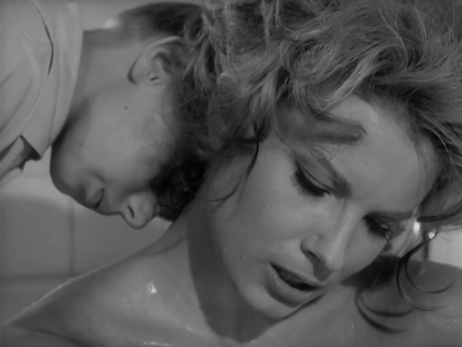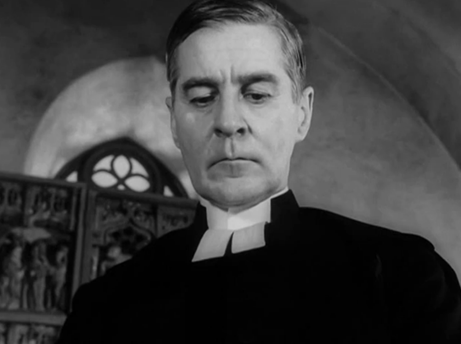
If I didn’t know any better I would say what the desires of the kids at the center of this early Bergman picture, sound like the American Dream. Except maybe it’s the Swedish Dream and maybe the main tenets are all but universal to many of the wide-eyed, angsty teens out there.
The lives of Harry (Lars Ekborg) and Monika (Harriet Andersson) have undoubtedly been witnessed countless times. They’re both in unfulfilling jobs. He’s an introverted laborer at a packing house where he’s not particularly happy and his constantly sub-par work ethnic receives the repeated wrath of his superiors. Meanwhile, the spirited Monika spends her days at a grocery store with a skirt chaser. Hardly the ideal environment.
But between Harry and Monika love blooms. He buys her a small trifle. They go to the movies together and she cries over the reveries on screen. This only serves to magnify how unpleasant real life feels, a far cry from the dreams they hold as working-class youth in Stockholm.
However, on a whim, Harry commandeers his father’s boat and Monika leaves behind her two annoying brother and nagging mother for adventure on the high seas (or rather the archipelago). The sun is bright. The water glimmers with personified delight. And it’s much the same for these two as they frolick and enjoy the novelty of this romanticized getaway. Even though the film famously features brief nudity, rather than being utterly sexualized, in more ways it evokes the imagery of Genesis 2 (Adam and his wife were both naked, and they felt no shame). The shame comes later.
Right now, they’re yet another iteration of the love-on-the-run narrative that proves you only need a mode of transport and passion does the rest — carrying lovers away on its gleeful wake.
Because at that age we’re all grasping at something intangible that floats above us tantalizing us every day of our lives. There’s not enough experience in life yet to know any better and so we go out and crave these pie and the sky ideals. Until it turns out were really grasping at straws. There’s nothing there for us. Only a harsh reality check.
As they often have a habit of doing, dreams so quickly turn themselves into nightmares and all the hopes that we clung to are dragged through the brush and the briar. So by the end, they’re muddied with dirt. That doesn’t have to be the end, however. Nor do you have to give in to your dreams being trampled.
As in the case of Harry and Monika, you can try and make a go of it the normal way. Grinding out an existence, poor and trying to eke by paycheck to paycheck. There’s a child now and he’s going to school to earn a better life, nagging like a conscientious adult about saving money and making their rent payments on time. There’s the constant bickering when he comes home tired from work and she’s discontent with this very mundane, sedentary lifestyle. There’s no allowance to go to the movies or buy some new clothes.
Soon she’s going to the arms of another man. Divorce is all but inevitable. How could all this happen in rapid succession you ask? Perhaps Summer With Monika is an exercise in heightened drama but Bergman, in essence, seems to be plotting the cycles of life and what hard-edged reality does to you.
It runs you up against the rocks, often destroys all your well-meaning aspirations, and leaves you disgruntled. Especially when we’re young we run that risk but any type of love, even those relationships founded in shallow soil, are rapturous when times are good. It’s a true test of stability when the bad times hit or further still the banality of the everyday. If you are still in love with a person even in those moments, perhaps that’s when you know you have a marriage with staying power.
It didn’t occur to me until well into the picture because I can be slow-witted with a thick skull but early on in the film, we have one of the old-timers observing that it’s springtime. The film is Summer with Monika and that embodies the happy times in the sun. But of course what must follow is Fall where everything begins to fall apart and then there are the bleakest depths of winter which are trying for any relationship to attempt to weather. All Harry can do is look back and yearn for those summer months. Although by wintertime it’s already far too late.
Bergman’s ultimately portentous parable is gorgeously rendered as usual. In fact, I’m not sure if I have ever seen a film by the Swedish maestro that wasn’t so. There’s a crispness to the black and white that while unadorned and unglamorous is nevertheless pure and blatantly arresting. In the moments of free, uninhibited youth it so exquisitely captures that mood while just as quickly shifting into the frigid moments as youthful innocence is forced to die.
4/5 Stars








 Minus feels he is lacking love and affection. He feels like his sister makes fun of him while his father is aloof and withdrawn from his life. Meanwhile, David is grief-stricken in private, realizing that his daughter’s condition is incurable and yet he also regrets his morbid fascination with it. David tries to cope with his wife’s condition, but although she seemed jovial and fine at first, Karin’s situation begins to decline.
Minus feels he is lacking love and affection. He feels like his sister makes fun of him while his father is aloof and withdrawn from his life. Meanwhile, David is grief-stricken in private, realizing that his daughter’s condition is incurable and yet he also regrets his morbid fascination with it. David tries to cope with his wife’s condition, but although she seemed jovial and fine at first, Karin’s situation begins to decline.


